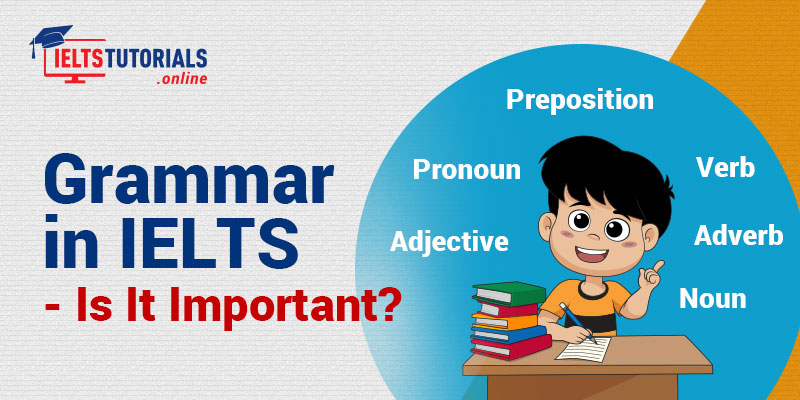
Importance Of Grammar In IELTS Test
"Is Grammar important to get higher IELTS Band Score?"
Many IELTS aspirants have this question in their mind while they undergo IELTS Test preparation because none of the question types directly assesses Grammar skills.
But, you might be surprised to know that "Yes, Grammar do play a crucial role in getting a high IELTS Score".
One can say that Grammar is the backbone of all the languages - whether it is English, Hindi, Punjabi, Vietnamese or other languages you know. And, it is imperative for IELTS Test too.
Adequate and appropriate knowledge of Grammar is essential for all the four skills tested in IELTS Exam - Listening, Reading, Writing and Speaking. However, the level of its importance may vary from one module to another.
Why is Grammar so important in IELTS Test?
Let's have a look at each module!
IELTS Writing Module
In IELTS Writing - Academic and General Training Tests, you are given two tasks. Task 1 demands you to write 150 words while in Task 2 you need to write 250 words.
These writing tasks are examined as per the following four criteria - Task Achievement (for Task 1)/Task Response (for Task 2), Coherence & Cohesion, Lexical Resource, Grammatical Range & Accuracy. Here, Grammar constitutes almost 25% of your total Writing Score.
So, no matter how good is your vocabulary, you will not be able to generate a meaningful and interesting content if your Grammar is not good.
Thus, Grammar is required to make your content more meaningful and interesting.
IELTS Speaking Module
Just like IELTS Writing, Speaking Test is also evaluated on the basis of four major criteria - Fluency & Coherence, Lexical Resource, Grammatical Range & Accuracy and Pronunciation. So, Grammar makes up to 25% of your IELTS Speaking Score.
In Speaking Test, you need to actively use different grammar structures in order to express your ideas clearly. At the same time, you need to be as fluent as possible. Thus, when you are speaking, you need to ensure that you are grammatically correct and that your answers make sense. All these results in fetching a good Band Score.
IELTS Listening & Reading Module
Though Grammar does not play an essential role in Listening and Reading modules, proper grammatical knowledge is still needed to select correct answers. The choice of your answers somehow depends on the Grammar which in turn affects your Band Score.
Now that you are well aware of the importance of Grammar in IELTS Exam, here is a key to fetch high IELTS Band Score.
FOLLOW THE GRAMMAR RULES
1. Verb Tense
- Use Simple Present Tense while talking about general, repetitive and permanent aspects
- To talk about on-going or progressive actions, use Simple Continuous Tense
- Use Simple Past Tense while describing about the events that occurred in the past and has no relevance in the present
- Use Present Perfect Tense for events that occurred in the past but still has a connection with the present
2. Voice
- Make use of Passive Voice to sound more formal and impersonal
3. Modal verbs
- 'Could', 'Might' and 'May' are the modal verbs used to refer to uncertain actions of future
- Use them to describe different nuances. For example, when you want to express degrees of certainties
- 'Could have', 'Might have' and 'May have' are used to express possible actions in past or present
- 'Can' is used to write general possible statements about present
- 'Must' is used when you want to express something that is absolutely true or correct
4. Definite Article
- 'The' is used while describing one of something in a specific area. For instance, the river, the bridge
- It is also used to describe cardinal numbers (first, second), superlatives (the best), places that refers to a group of states (the USA)
- Make use of 'the' wisely before nouns and abstract nouns. For example, exercise is good for the body.
5. Adjectives
Proper use of adjectives often indicates a candidate's wide range of vocabulary in Speaking and Writing modules. You can describe people, things and places or compare them with the help of adjectives. But, there are some rules that you must know.
- For comparison you can take '-er' and for superlative, you can take '-est' at the end of a word.
We moved to a safer place.
This is the safest place in the city.
- Two-syllable or three-syllable adjectives use 'more' and 'the most' to form comparative and superlative.
This is the most delicious dish I've ever tasted.
She looks more beautiful than I expected.
6. Prepositions
Adequate knowledge about prepositions is must so as to avoid confusion regarding the usage of different preposition with the same word.
For Example,
He was pleased with the speaker.
He was pleased to hear his favourite song.
These are some of the Grammar Rules that you need to know to achieve a higher IELTS Score. Remember, just learning these rules is not enough. You have to put these rules into practise by attempting IELTS Practice Tests and getting them evaluated from experts to notice your progress. Once you will see improvement in your Grammar skills, you will get more confident for your IELTS Test and get ensured to achieve your desired IELTS Band Score.